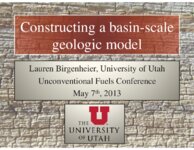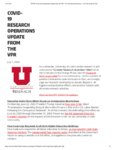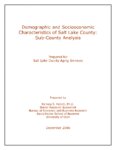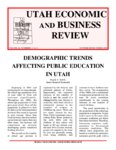TO
Filters: Collection: "ir_eua" Type: "Text"
| Title | Date | Subject | Description | ||
|---|---|---|---|---|---|
| 376 |
 |
Conference theme - October 1980 International Symposium Industrial Process Combustion Technology | 1980 | ||
| 377 |
 |
Conjunctive surface and groundwater management in Utah: Implications for oil shale and oil sands development | 2011-12-31 | Unconventional fuel development; Conjunctive water use; Surface water; Groundwater; Utah; Utah water law; Oil shale; Oil sands | Unconventional fuel development will require scarce water resources. In an environment characterized by scarcity, and where most water resources are fully allocated, prospective development will require minimizing water use and seeking to use water resources in the most efficient manner. Conjunctive... |
| 378 |
 |
Constructing a basin-scale geologic model | 2013-05-07 | Unconventional fuels; Green River Formation; Uinta Basin; Geologic model; Workflow; Reservoir; Basin-scale model | Presentation given at the University of Utah Unconventional Fuels Conference, Salt Lake City, Utah, May 7, 2013. |
| 379 |
 |
Contemporary projections of Utah's population portend relatively small increases in higher education enrollments | |||
| 380 |
 |
Control of process aid used in hot water process for extraction of bitumen from tar sand | 1984-07-31 | Tar sand; Bitumen; Tar sand feed; Free surfactant content; Slurry; Bitumen froth recovery; Bitumen; Hot water process; Bitumen extraction; Extraction circuit | The hot water process is sensitive to the nature of the tar sand feed, which varies. An alkaline process aid, usually NaOH, is normally added to the conditioning step of the process and is needed to obtain good bitumen recovery from most tar sand feeds. The invention is based on the discovery that, ... |
| 381 |
 |
Control strategies for abandoned in situ oil shale retorts | 1979-04 | In situ oil shale retorting may result in a number of environmental impacts including degradation of local surface and groundwaters, low resource recovery and subsidence. The target of present oil shale commercialization activities is the Mahogany zone in Colorado's Piceance Creek Basin. The princip... | |
| 382 |
 |
Conversion of hydrocarbon gases to liquid in the fluidized bed retort | 1987-06-12 | A free radical steady-state mechanism has been developed to explain qualitative and quantitative aspects of the generation of hydrocarbon gases in the solid-recycle fluidized bed retort. The mechanism relies on what is known about butane cracking. The 1- and 2-butyl free radicals have been studied a... | |
| 383 |
 |
Conversion of tar sand bitumen and heavy crude to high yields of aviation turbine fuel | 1989 | tar sand bitumen; heavy crude; aviation turbine fuel yeilds; tar sand bitumen conversion; heavy crude conversion | The production of specification quality military aviation turbine fuel from low grade domestic fossil energy resources is of interest to the United States Air Force. This paper describes a U.S. Air Force sponsored study of the conversion of tar sands bitumens and heavy crudes into high yields of spe... |
| 384 |
 |
Core-based integrated sedimentologic, stratigraphic, and geochemical analysis of the oil shale bearing Green River Formation, Uinta Basin, Utah | 2011-04 | Utah; Green River Formation; Lake Uinta; Mahogany zone; Lake evolution; Oil shale development; Uinta Basin | An integrated detailed sedimentologic, stratigraphic, and geochemical study of Utah's Green River Formation has found that Lake Uinta evolved in three phases 1) a freshwater rising lake phase below the Mahogany zone, 2) an anoxic deep lake phase above the base of the Mahogany zone and 3) a hypersali... |
| 385 |
 |
Coring and testing wells Asphalt Ridge, Utah | 1957-10-21 | A second well was cored and some injection and production tests were made using this well and the well that already existed on Gulf's Palmer lease at Asphalt Ridge, Utah. The formation that has been tested is the Duchesne River, which is more lenticular and erratic than the Mesa Verde which contains... | |
| 386 |
 |
Courses | Courses provided at the University of Utah | ||
| 387 |
 |
COVID-19 is a frightening factor this Halloween | 2020-10-23 | COVID-19; Halloween | Planning for trick-or-treating during COVID-19 |
| 388 |
 |
COVID-19 research operations update from the VPR | 2020-07-07 | COVID-19; research | Announcement on research operations during COVID-19 pandemic |
| 389 |
 |
Critical issues in Utah's future: volume II | 1977-02 | ||
| 390 |
 |
CRS report for Congress: Developments in oil shale | 2008-11-17 | Green River; Oil shale formation; Colorado; Utah; Wyoming; Oil; Oil shale; Diesel; Jet fuel; Department of Energy; DOE; Synthetic fuels; Petroleum; Energy Policy Act of 2005; EPAct; BLM; Oil research, development, and demonstration; RD&D; Programmatic Environmental Impact Statement; PEIS; Oil shale ... | The Green River oil shale formation in Colorado, Utah, and Wyoming is estimated to hold the equivalent of 1.38 trillion barrels of oil equivalent in place. The shale is generally acknowledged as a rich potential resource; however, it has not generally proved to be economically recoverable. Thus, it ... |
| 391 |
 |
Crumb rubber dispersion in tar sand bitumen | 1996 | crumb rubber dispersion; tar sand bitumen; crumb rubber; scrap rubber; bitumen co-processing | The results from preliminary experiments of scrap rubber and bitumen co-processing aimed at preparation of a polymer-modified asphaltic product are presented. For 20 and 40 wt% rubber content in rubberized asphalt, complete rubber dispersion in the bitumen was obtained. |
| 392 |
 |
Current activity in oil production from U.S. tar sands | 1979-06-12 | Oil Production; U.S. tar sands; UNITAR; Oil shale; Tar sands; Utah; Oil recovery; Heavy oil; Gas; Hydrocarbon material; Viscous crudes; Oil deposits; Texas; California; New Mexico; Kentucky | In a 1978 paper "Important for the Future" issued by UNITAR, reference was made to a quotation from a study by Resources for the Future, entitled "Energy in the American Economy: 1850-1975," by Messrs. Schurr and Netschert. The quotation is: "Relatively simple calculations of the volume of oil shale... |
| 393 |
 |
Data informed multipoint ground flare evaluation using measurement and theory | This paper will explore the comparison of experimental (PFTIR) and simulation data obtained from assisted multipoint ground flares operating at high turndown. The flare assist is intended to encourage air entrainment for best combustion efficiency as well as reduce visible smoke. Operational envelop... | ||
| 394 |
 |
Decarbonizing: the future of hydrogen firing | Historically, firing hydrogen fuel was only economical in certain applications outside of the power industry. Unlike other fossil fuels, hydrogen does not naturally exist as H2 and is commonly produced in hydrogen reformers and considered an energy carrier and not an energy source. Steam-methane ref... | ||
| 395 |
 |
Definition and world resources of natural bitumens | 1990 | Natural bitumens, semisolid or solid mixtures of hydrocarbons and as much as 50 percent heterocyclic compounds, are composed largely of carbon and hydrogen but have substituents of nitrogen, oxygen, sulfur, and trace metals, especially iron, nickel, and vanadium. Bitumens are soluble in organic solv... | |
| 396 |
 |
Delineation of gas sands by seismic stratigraphy in the Pericocal area, Orinoco Heavy Oil Belt, Venezuela | 1987 | gas sands; seismic stratigraphy; Pericocal area; Orinoco Heavy Oil Belt; deliniation of gas sands; gas sand bodies | The purpose of this study is to define the extent of gas sand bodies found in the Oficina Formation by well SDZ-79X, in the Pericocal area of the Orinoco Heavy Oil Belt. True amplitude processing was applied to 30 km (19 mi) of seismic survey lines in the vicinity of this well. The processing showed... |
| 397 |
 |
Demographic and socioeconomic characteristics of Salt Lake County: sub-county analysis | 2006-12 | Salt Lake County; Projections; Estimates; Aging population; Baby boom; Utah; Salt Lake Aging Services; Kennecott Land | This paper is an examination of the shifting geographic distribution of the population within Salt Lake County over time as well as an analysis of the spatial distribution of its demographic and socioeconomic characteristics. It builds on the county-level analysis included in a separate section of t... |
| 398 |
 |
Demographic patterns and characteristics of Utah | The historical emphasis on numbers rather than on the quality and make-up of the population, though scarcely justifiable, is understandable. Concentration on a single magnitude certainly simplifies the projection of a population. To illustrate, the world population is now approximately 3.5 billion. ... | ||
| 399 |
 |
Demographic trends affecting public education in Utah | 2000-11 | Beginning in 2004 and continuing for at least a decade, the school age population (5 to 18 year olds) in Utah will increase significantly. Throughout the 1990s, the school age population in Utah grew more slowly than did the population in general so that its share in the total population declined. T... | |
| 400 |
 |
Demographic trends and high development "The Utah MX Baby Bomb" | 1981-04 |
